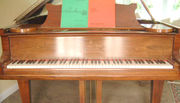
Throughout the 18th and early 19th centuries, pianos were financially beyond the reach of most families, and the pianos of those times were generally the property of the gentry and the aristocracy. Visiting music masters taught their children, more often the girls than the boys, to play the piano. It was widely felt at the time that ability to play the piano made young women more marriageable.
Women who had learned to play as children often continued to play as adults, thus providing music in their households. For instance, Emma Wedgwood (1808-1896), the granddaughter of the wealthy industrialist Josiah Wedgwood took piano lessons from none other than Frédéric Chopin, and apparently achieved a fair level of proficiency. Following her marriage to Charles Darwin, Emma still played the piano daily, while her husband listened appreciatively.
A number of female piano students became outright virtuose, and the skills of woman pianists inspired the work of Haydn, Mozart, and Beethoven, who dedicated difficult-to-play works to their woman friends. However, careers as concert musicians were typically open only to men (an important exception was Clara Schumann).
Over the course of the 19th and 20th centuries, the middle class of Europe and North America increased in both numbers and prosperity. This increase produced a corresponding rise in the domestic importance of the piano, as ever more families became able to afford pianos and piano instruction. The piano also became common in public institutions, such as schools, hotels, and public houses. As elements of the Western middle class lifestyle gradually spread to other nations, the piano became common in these nations as well, for example in Japan.
To understand the rise of the piano among the middle class, it is helpful to remember that before mechanical and electronic reproduction, music was in fact performed on a daily basis by ordinary people. For instance, the working people of every nation generated a body of folk music, which was transmitted orally down through the generations and sung by all. The parents of Joseph Haydn (1732-1809) could not read music, yet Haydn's father (who worked as a wheelwright) taught himself to play the harp, and the Haydn family frequently played and sang together. With rising prosperity, the many families that could now afford pianos and music adapted their home-grown musical abilities to the new instrument, and the piano become a major source of music in the home.
Amateur pianists in the home often kept track of the doings of the leading pianists and composers of their day. Professional virtuosi wrote books and methods for the study of piano playing, which sold widely. The virtuosi also prepared their own editions of classical works, which included detailed marks of tempo and expression to guide the amateur who wanted to use their playing as a model. (Today, students are usually encouraged to work from an urtext edition.) The piano compositions of the great composers often sold well among amateurs, despite the fact that, starting with Beethoven, they were often far too hard for anyone but a trained virtuoso to play perfectly. Evidently, the amateur pianists obtained satisfaction from coming to grips with the finest music, even if they could not perform it from start to finish.
A favorite form of musical recreation in the home was playing works for four-hand piano, in which the two players sit side by side at a single piano. Sometimes members of the household would sing or play other instruments along with the piano.
Parents whose children showed unusual talent often pushed them toward professional careers, sometimes making great sacrifices to make this possible. Artur Schnabel's book My Life and Music (reprinted 1988; Mineola, NY: Dover) vividly depicts his own experience along this lines, which took place in the Austro-Hungarian Empire in the late 19th century.
The piano's status in the home remained secure until technology made possible the enjoyment of music in passive form. First the player piano (ca. 1900), then the home phonograph (which became common in the decade before World War I), then the radio (in the 1920s) dealt severe blows to amateur piano-playing as a form of domestic recreation. During the Great Depression of the 1930s, piano sales dropped sharply, and many manufacturers went out of business.
Another blow to the piano was the widespread acceptance in the late 20th century of the electronic keyboard. This instrument, in its cheaper forms, is widely considered to provide only a poor substitute for the tonal quality of a good piano (see piano for why), but it is much more flexible and in many ways better suited to the performance of popular music.
Nevertheless, the piano survives to this day in many 21st century homes. The pianos being bought today tend to be of higher quality and more expensive than those of several decades ago, suggesting perhaps that domestic piano playing may have concentrated itself in homes of wealthier or better-educated members of the middle class. It is unlikely that ability to play the piano contributes much these days to the marriageability of daughters, but many parents still feel today that piano lessons teach their children concentration and self-discipline, and open a door into the world of classical music.
Further reading
- Piano roles : three hundred years of life with the piano by James Parakilas (New Haven, CT: Yale University Press, 1999) is a history of the piano and its role in society.
Categories: Piano | Music history




 216.73.216.133
216.73.216.133 User Stats:
User Stats:
 Today: 0
Today: 0 Yesterday: 0
Yesterday: 0 This Month: 0
This Month: 0 This Year: 0
This Year: 0 Total Users: 117
Total Users: 117 New Members:
New Members:
 216.73.xxx.xxx
216.73.xxx.xxx
 Server Time:
Server Time: